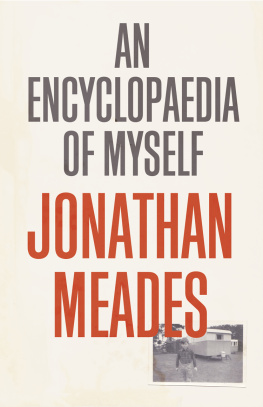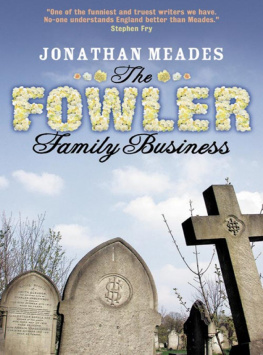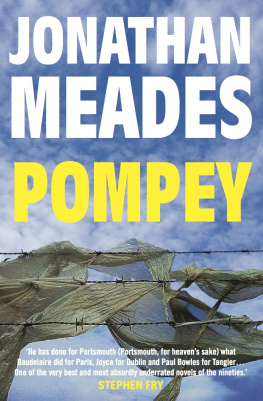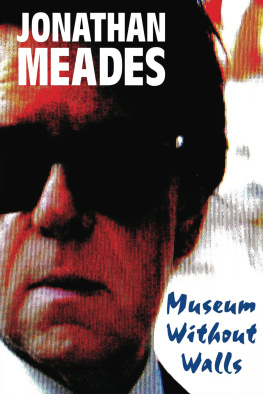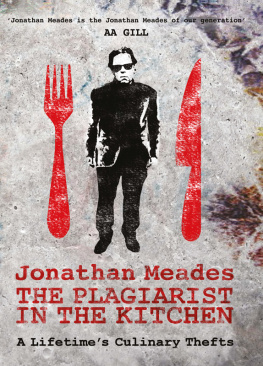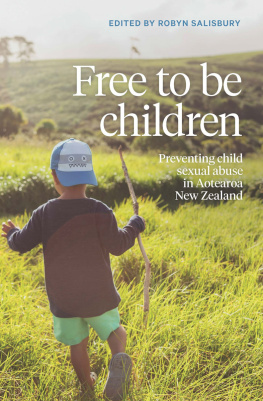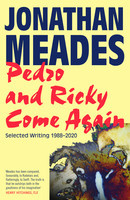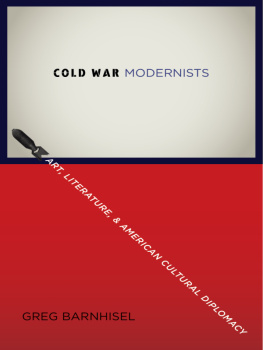Table of Contents
AN ENCYCLOPAEDIA OF MYSELF
Jonathan Meades

For The Dead
Nothing wilfully invented.
Memory invents unbidden.
Not applicable. I have no sexual abuser to confront.
There was no simpering, gingivitic distant cousin with crinklecut hair who beseeched me to come and play with a special mauve toy.
No wispily moustached, overfriendly, oversweaty friend-of-the-family whom I was made to address as aunt, who tucked me up then, who must be hunted down now. What, anyway, was signified by that odd epithet? Could the friend-of-the-family not make up its mind whom, in particular, in the family, it was a friend of? My family did not have friends-of-the-family. Friend-of-the-family is as much an alarm bell as magician and childrens entertainer.
No doddering nonagenarian former magician and childrens entertainer whose dirty secret was buried half a century ago and is now all but lost in the soup of dementia.
No lissom-fingered groin-pirate for me to approach as he opens his gate, all crazed-paint and rot. A ragged cotoneaster hedge flanks the gate. I can see the mange-like patches where the bungalows render has slipped to reveal the friable bricks. The own-brand Scotch in his naugahyde bag weighs down that bad bad hand of his.
No failed oboist, foxed scores all around, listening covetously to a prodigious pupil, gazing at a soggy autumn garden and broken paling.
No, no, none of those. I was not, in the brusque cant of the day, interfered with. I didnt have what it takes. No adult wanted to love me that way. I was pretty enough, but it takes more than prettiness. It takes foolhardy insouciance, it takes uncomprehending nerve to return the stare of the not yet abuser, the tempter, and so, in his eyes, legitimise the compact and become complicit, willing and an equal partner in sex crime. Only the rash venture into the unknown from which there is no chaste return. I never had that rashness, was never a daredevil. Look right look left look right again then repeat it all.

So, now a pre-dotard, I am left bereft. I am denied the sine qua non of recollective bitterness, mnemonic poignancy. Denied a cause of self-pity a cause? The cause. Denied, then, the chance to incite the pity of others, to milk the worlds sympathy gland. I lack the paramount qualification of the auto-encyclopaedist. No abuser (I am, apparently, unique in this) no abuser, so no life, no story.
Were I to stroll down False Memory Lane at dusk I might pick out a mac lurking in the grubby alders beside a playground: You there! You
But that would to be to invoke nothing but dated clich. Playgrounds! Macs! The predator surely wouldnt announce himself by that dun uniform: hed have had a gift for camouflage, hed have been in mufti, hed have been anywhere but on the school bus.
As well as clich it would be a lie. There are strata of mendacity best left unbroached.
Why be so fastidious? Lies are humans desperate balms and risible solaces.
Where would we be without monotheism, fasts, judicial impartiality, the eucharist, sincerity, porks proscription, Allahs ninety-nine names and seventy-two virgins, weather forecasts, life plans, political visions, conjugated magpies, circumcision, sacred cows, the power of prayer, insurance policies, gurus prescriptions, the common good, astrology?
Where indeed?
But those are the big lies.
Little lies, microfibs, are different. They are insidious. They go undetected, pebbles added furtively to a cairn. Every time I write once upon a time I am, anyway, already exhuming the disputable, conjuring a photocopy of a faded print made from a detrited negative. I am striving to distinguish the original from its replays. So why add to the store of the provisional? The forms and shades of what used to be are already hideously mutable, every act of recall is both an erosion and an augmentation. I remember therefore I reshape.
Further, memory is susceptible to contamination by a secondary memory, of the place where I find myself when the first occurs. Thus I cannot help but picture the swaying mane of the weeping willow I was dozing beneath at East Harnham in summer 1996 when my mind was suddenly filled with a dizzy, joyful, chlorinated night more than thirty years before, the night I cut the ball of my right foot beside the swimming pool at West Park Farm (broken glass? crown cork?), didnt realise I had done so and laid a trail of blood through the loud house where teenagers clutching bottles of fruitgum-bright liqueurs shed inhibitions and just a few clothes.
The secondary location seeps into what is playing in my inner cinema just as the Gaumonts hefty 1930s-Tudorish dcor would intrude on the purity of the screens illusionism. Westerns canyons, gulleys and hoodoos, Denver Pyles badman grin in The Restless Gun, the tarred hut on the dunes in Forbidden Cargo where Joyce Grenfell and Nigel Patrick pretend to be ornithologists, West of Zanzibars smugglers dhows, the shack-like Snowdonian garage that yields the clue to Jack Hawkins in The Long Arm: they were infuriatingly framed by beams, halberds, casques, tapestries, chandeliers. These interventions from a competing pageant exacerbated my inability to distinguish between the fictive, the factual, the fantastical.
The formula states that adults are wicked predators, children are innocent prey. In the hierarchy of abuse, paedophilia (which may be literally that, liking children) is demonised, fetishised. It has giddily attained equal status with race crime. (Stabbing an Arab in a Maida Hill launderette simply because she is an Arab is a more serious offence than stabbing her because she jumped the queue for the one functioning dryer or pocketed a garment left in the lugubrious drum by the previous user or because she is a woman. She can of course take comfort from this knowledge as she loses consciousness on a reddening moraine of fresh-baked sheets. The culprit, the gravity of whose crime is determined by motive rather than effect, will, if arraigned, plead a different cause and claim that his action was motivated by something apart from race and otherness.) Homo faber. Isnt he just? Man has devised multitudinous forms of child abuse which are not sexual. Not covertly sexual, not displacedly sexual. Their immeasurable consequences may, however, be just as grave as those of sexual abuse.
Child soldier, child slave, child labourer, child miner, child skiv, child beggar, child bloody from scrounging in the shambles.
There were children before there was childhood. There have always been children. There has not always been childhood. Steam, foundries, pollution, unprecedented urban concentrations, megalopolitan sprawl, soot, canalisation, dams the industrial revolutions manifestations were, as early as 1873, described by Antonio Stoppani as a new telluric force which in power and universality may be compared to the greater forces of earth. Since then the worlds population has multiplied fivefold. Humankind propels the atmosphere. It has unwittingly created a geological age which the meteorologist and chemist Paul Crutzen named the anthropocene.
Modern western European childhood is a by-product of industrial revolutions, thus an invention of adults. It is protracted, an antechamber to longed-for adulthood, a mere waiting room before we achieve the real thing. Whilst it is hardly an abuse, it is a temporal space where communitarianism and generational apartheid are enforced. Its characteristic condition is attritional boredom, a boredom that foments the desire to escape, no matter how, and to punish the captors. Until the era of enclosures, rural diaspora and urbanisation, childhood had been the province of the lettered classes. Thereafter, throughout the nineteenth century childhood, like recreational drugs in the later twentieth century, became gradually democratised, available to all save the very poor (who needed it most). The change is readily ascribable to a succession of education acts which ordained the free provision of schooling and ever more elongated compulsory attendance. Schools occasioned a concentration of coevals: the child spends most of his time with other children.
Next page
